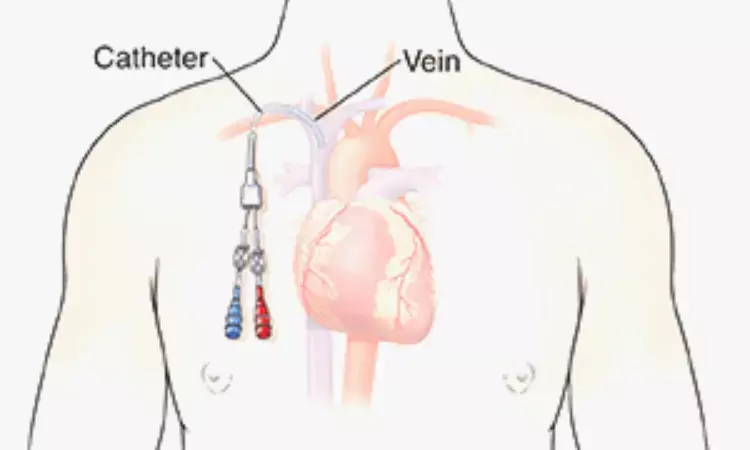- Home
- Medical news & Guidelines
- Anesthesiology
- Cardiology and CTVS
- Critical Care
- Dentistry
- Dermatology
- Diabetes and Endocrinology
- ENT
- Gastroenterology
- Medicine
- Nephrology
- Neurology
- Obstretics-Gynaecology
- Oncology
- Ophthalmology
- Orthopaedics
- Pediatrics-Neonatology
- Psychiatry
- Pulmonology
- Radiology
- Surgery
- Urology
- Laboratory Medicine
- Diet
- Nursing
- Paramedical
- Physiotherapy
- Health news
- Fact Check
- Bone Health Fact Check
- Brain Health Fact Check
- Cancer Related Fact Check
- Child Care Fact Check
- Dental and oral health fact check
- Diabetes and metabolic health fact check
- Diet and Nutrition Fact Check
- Eye and ENT Care Fact Check
- Fitness fact check
- Gut health fact check
- Heart health fact check
- Kidney health fact check
- Medical education fact check
- Men's health fact check
- Respiratory fact check
- Skin and hair care fact check
- Vaccine and Immunization fact check
- Women's health fact check
- AYUSH
- State News
- Andaman and Nicobar Islands
- Andhra Pradesh
- Arunachal Pradesh
- Assam
- Bihar
- Chandigarh
- Chattisgarh
- Dadra and Nagar Haveli
- Daman and Diu
- Delhi
- Goa
- Gujarat
- Haryana
- Himachal Pradesh
- Jammu & Kashmir
- Jharkhand
- Karnataka
- Kerala
- Ladakh
- Lakshadweep
- Madhya Pradesh
- Maharashtra
- Manipur
- Meghalaya
- Mizoram
- Nagaland
- Odisha
- Puducherry
- Punjab
- Rajasthan
- Sikkim
- Tamil Nadu
- Telangana
- Tripura
- Uttar Pradesh
- Uttrakhand
- West Bengal
- Medical Education
- Industry
Rare case of VCS syndrome 6 years after central venous catheter removal reported in a patient on hemodialysis

Netherlands: Researchers from the Netherlands have stressed the importance that vena cava superior (VCS) syndrome can occur late following the removal of central venous catheters. The findings, published in Case Reports in Nephrology and Dialysis, imply that clinicians should be aware of its symptoms in any patient with a history of an upper central line.
Vena cava superior syndrome is a rare complication of central venous catheter placement. The syndrome usually occurs when the catheter's presence causes intraluminal obstruction or thrombosis.
In the case report, Michelle Janssen and her associate described the case of a 72-year-old female patient on intermittent hemodialysis who had been free of any venous central line for over 6 years and presented with VCS syndrome.
The patient was suspected of having VCS syndrome. A CT scan confirmed the diagnosis of VCS syndrome. Regarding the cause of the VCS syndrome, no external compression of the VCS by any tumor was seen on the CT scan. Extensive collateral vein formation implicated an already long-existing situation. Therefore, they reviewed her past medical history. In short, the CT scan showed an absent VCS without extravascular compression. Previous catheter placement was diagnosed as the case of VCS syndrome.
Following the diagnosis of the VCS syndrome, the patient was referred to a vascular expertise center where a percutaneous recanalization of the VCS and left brachiocephalic vein was performed and a self-expanding stent (14 × 60 mm) was placed. An oral anticoagulant medication was prescribed for 6 months after the procedure. Symptoms of the VCS syndrome subsided after this procedure.
The researchers concluded, "occlusion of VCS syndrome as a complication of the central venous catheter is rare but should be recognized."
"Even years following the removal of the catheter, one should consider the diagnosis when symptoms of VCS syndrome occur in a patient who had central-venous-catheter placement in the past medical history," they wrote.
Dr Kamal Kant Kohli-MBBS, DTCD- a chest specialist with more than 30 years of practice and a flair for writing clinical articles, Dr Kamal Kant Kohli joined Medical Dialogues as a Chief Editor of Medical News. Besides writing articles, as an editor, he proofreads and verifies all the medical content published on Medical Dialogues including those coming from journals, studies,medical conferences,guidelines etc. Email: drkohli@medicaldialogues.in. Contact no. 011-43720751


